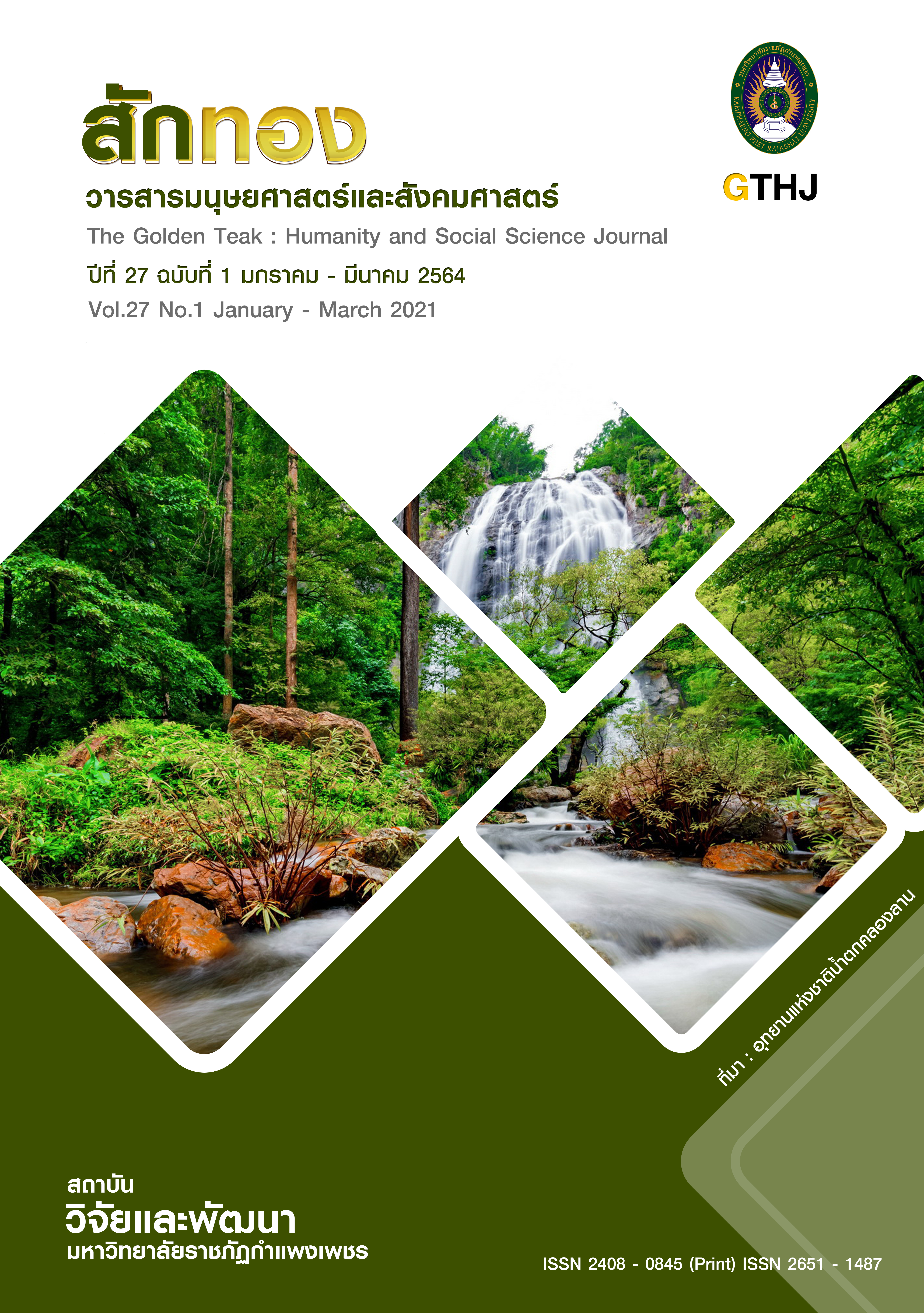The Potential of Hand Woven Fabric Production of Phon Phisai District, Nong Khai Province
Main Article Content
Abstract
This research aims to study the production system of hand woven fabric, and to assessment the potential of hand woven fabric production of Phon Phisai district, Nong Khai province. Data gathering form 6 manufacturers of hand woven fabric by structured interview form, potential assessment form, and questionnaire for customer satisfaction 54 persons. Data analysis by content analysis, and using descriptive statistics include frequency, percentage, mean, and standard deviation. The results found that: 1) the production system of hand woven fabric of Phon Phisai district, Nong Khai province for the inputs of the production system shown that all of manufacturers owning their area for producing, weaving by themself, owner's capital, there are a few that lone from external funding sources. The main raw material used for weaving can be produced in the community. For process of production system found that manufacturers can weave 1 piece of cloth for 3 days, spend 50-2,000 baht, sell at 100-2,000 baht, and have a frequency of selling 2-3 times a month. All of food manufacturers control quality of production by themselves with the selection of quality raw materials, they has no health problems, and no accidents from production. The outputs of production system shown that hand-woven cotton has increased sales over a period of 3 years. Almost of manufacturers do not have brand and packaging, some of producers asked verbally about customer satisfaction. There is only 1 manufacturer/product that has received community product standards and received a 4-stars OTOP. 2) The potential of hand woven fabric production of Phon Phisai district, Nong Khai province found that: Hand-woven silk has the overall of potential, and the product quality aspect is very low level, while the product and strength of the community, and marketing and product history aspect have low level of potential. For the production of hand-woven cotton with the potential in the overall, and product quality aspect at very low levels, while the potential of product and the strength of the community is good level.
Article Details
บทความที่ได้รับการตีพิมพ์เป็นลิขสิทธิ์ของวารสาร สักทอง : วารสารมนุษยศาสตร์และสังคมศาสตร์ สถาบันวิจัยและพัฒนา มหาวิทยาลับราชภัฏกำแพงเพชร
ข้อคิดเห็นใดๆ ที่ปรากฎในวารสารเป็นวรรณกรรมของผู้เขียนโดยเฉพาะ ซึ่งมหาวิทยาลัยราชภัฏกำแพงเพชรและบรรณาธิการไม่จำเป็นต้องเห็นด้วย
References
Chaiprakong, T. & Kornlert, P. (2018). Study and analysis of cost, volumn and profit on cotton hand weaving products: A case study of Ban Nong Ab Chang village, Sobtia sub-district, Chom Thong district, Chiang Mai province. Payap University Journal, 28(1), 71-83.
Chuenban, S. (2015). Optimizing resource allocation using simulation and genetic algorithm in electronic industry. (Master’s thesis). Department of Industrial Engineering, Faculty of Engineering, Thammasat University.
Cochran, W.G. (1977). Sampling Techniques. (3 rd ed.). New York, USA : John Wiley & Sons.
Kitipakorn, P. (2010). Line balancing and resource planning using computer simulation: case study food products industry. (Master’s thesis). Department of Industrial Engineering, Faculty of Engineering, Thammasat University.
Korbuakaew, S. (2009). Industrial production management. Bangkok : Faculty of Industrial Technology, Suan Sunandha Rajabhat University.
Lee, S. & Pianthong, N. (2007). Development of a new type of a rice-polishing cylinder using abrasive materials produced in Thailand. Ubonratchathani : Faculty of Engineering, Ubonratchathani University.
Niyomrath, R. (2008). Quality management. Bangkok : Suan Sunandha Rajabhat University, Faculty of Industrial Technology.
Niyomrath, R., Sangkhamanee, K. & Sarasit, S. (2017). The efficiency development of handicraft of Ban Dung district, Udon Thani province. Bangkok : Suan Sunandha Rajabhat University.
Nongkhai Business Support Center. (2016). Border trade conditions with neighboring countries between Thailand-The Lao People's Democratic Republic, Nong Khai province in 2015. Nongkhai : Nongkhai Customs.
Office of Local Knowledge Promotion and Community Enterprise. (2017). Integration plan for Foundation economic development and strong communities, Fiscal year 2018. Bangkok : Community Development Department, Ministry of the Interior.
Office of the Official Information Commission. (2016). Guidelines and criteria for selection of the best One Tambon One Product of the year 2016 (OTOP Product Champion, OPC). Bangkok : Office of the Permanent Secretary for the Prime Minister.
Srilert, K. & Kuptasthien, N. (2016). Waste reduction in induction hardening process: A case study. Journal of Engineering RMUTT, 14(2), 1-10.


